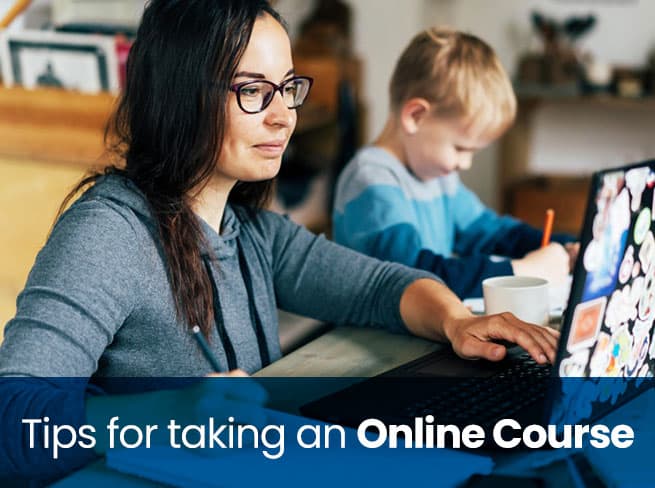
Whether you are studying for a career change towards job security and stability in these uncertain times or for growth in your current job role, there is a degree of discipline needed.
7 Easy Tips for Taking an Online Course and Succeeding
Studying is a great way to keep the mind sharp and to ensure you are always a step ahead of everyone if you want to achieve your career goals.
Studying online is completely different compared to the experience of classroom studies in college. eLearning gives students a level of flexibility to upskill themselves while in a full-time job.
Each day eLearning is attracting more and more students across the continent. however, there are serious challenges that will prevent many students from completing their courses successfully.
Although, there are many study strategies that are shown to be effective when it comes to studying online, here are 7 easy practical tips for taking an online course that elaborates on how to study smarter, not harder to ensure you achieve success.
1) Positive mental attitude
A Positive mental attitude is really important. A recent study conducted by Standford found that a positive attitude towards learning has the potential to boost our ability to learn and solve problems faster.
Researchers studied and found that students' having a positive mental attitude towards learning has the potential to boost their brain functions giving the ability to perform better in their subjects compared to students who start with a negative perception and outlook.
A negative mindset promotes bad behaviour, culture and can impact a students mental health. A negative mindset also has the potential to increase stress levels and a higher likelihood of failing a course.
Developing a positive mindset is the first step in committing to completing your education.
Setting a clear learning path and goals has huge potential benefits when it comes to maintaining a positive attitude.
2) Make a study plan
Writing down clear learning goals or objectives and then tracking your progress towards each goal is the best way to boost your motivation and increase your achievements.
Once you have clear and realistic goals drafted down. Define some clear milestones and break these goals down into smaller steps. This can help students stay more organised with clear focus on their online course progress.
It not only helps maintain a positive outlook but also creates more manageable and actionable study steps.
3) Start a study routine
Once everything is in place, it is time to start a study routine. A routine by definition means consistency.
Having a consistent routine starts with getting up and going at the same time every day or performing a task at a fixed time without fail.
In many cases, following a proper study routine is a sound strategy. The challenge for many students is sticking to a routine without the distractions.
Stop getting distracted by things that have nothing to do with your goals.
Setting a study time every day is important. Without it, people often procrastinate. Procrastination often has a negative connotation because people that procrastinate have a deep fear of failure or when a student is incapable of dealing with a task that they are afraid of failing in.
4) Read everything carefully before doing anything
Following directions is a learned skill that all students must master. But to follow any directions, students must learn to read everything properly.
Most often then not, students miss out the final details when reading articles, questions and directions.
By reading properly, we learn sentence structure, grammar, plot progressions, genre style and ultimately what the lecturer is trying to convey in their lessons.
Do not skim through everything.
Do you ever feel like you are spending too much time reading? Skimming while reading is a great way to grasp the meaning of an article in a short time.
Skimming is a quick process in viewing a section of text to get a general impression of the writer's main argument, theme, ideas and directions to perform certain tasks. There are generally 3 types of skimming known and that is preview, overview and review.
Skimming however poses a huge problem especially for students when English is not their first language. Skimming is covering a vast area of text at a faster pace while selectively picking up parts of information.
The problem in skim reading a page is that students will miss important steps and key instructions on a topic. Sometimes a sliver of text will throw the entire context of a sentence out rendering it redundant.
Not reading properly is one of the most common reasons why a student will fail.
5) Take breaks
Ensure you are getting plenty of rest and water. Insufficient sleep and liquid will cause dehydration. This will in turn release a hormone that will hinder a body from regenerating causing you to lose the ability to concentrate, focus and remember things.
When the ability to retain memories is affected, students studying most often read sentences over and over again in an attempt to understand it. Does this sound familiar?
Re-reading is inefficient but do not be alarmed as a majority of students are studying this way by re-reading their textbooks and notes. Research conducted shows that this is an inefficient way to learn materials.
Always support your active learning by utilising strategies such as drawing diagrams, utilising mind maps, flashcards and quizzing yourself.
6) Consolidate and take notes
Make it easy on yourself and ensure you have a way of consolidating your notes. Many students can generally type faster than they can write. This can make using electronic devices such as tablets and laptops the ideal choice for note-taking.
Choosing the right note-taking apps is ideal to help with organising your lectures and notes. Increase your chances of success by learning methods of note taking quickly with abbreviations.
Additional time can be saved using lists and tables, this will allow reciting and back referencing easier especially if students are revising for an online exam.
7) Participate in class discussions
Being actively involved in group discussions is one of the best ways to study and learn from other students going through the same processes. There are alot of benefits when it comes to group discussions.
It helps students to learn more while increasing their understanding of a subject or a lesson online. Studying in a group environment allows students to generate more ideas about a topic while also building confidence in themselves.
Don't lose heart.
Most importantly, don’t lose sight of the goal you have set for yourself. There will always be a time when you will be struggling with studying a certain subject/ unit.
Do not bite off more than you can chew, take it in strides. Small steps can lead to big changes
Many of our online students try to fit in their studies around work and family commitments. Most of our successful students that have graduated plan their workload ahead of time to make it possible to study and finish their course around the required time frame.
Before signing up to one of Applied Education's online courses, utilise the steps in these tips for taking an online course to find out the number of hours of study expected per day or Week.
Make a draft schedule for your accounting or bookkeeping course and see how it sits with the rest of your work and family commitments.
If needed, talk to your workplace about the flexibility in pursuing an online study either in the workplace or at home. Is it possible to study part-time? Can you take a week off each semester for exams? Studying will ultimately make you a more valuable employee.
Study with us at Applied Education.
At Applied Education, we understand that it is essential to remain relevant in the workforce and continuously strive for growth. If you are still deciding whether we are the right institution for you, check out our about us page and also consider following us on social media.
After reading our tips for taking an online course and if you are looking at taking an online course but unsure of which area best suits you, get in touch with one of our consultants today and we will endeavour to help you.
We make a sincere effort to ensure the accuracy of the material described herein; however, Applied Education makes no warranty, express or implied, with respect to the quality, correctness, currentness, accuracy, or freedom from error of this document or the products it describes.
Applied Education makes no representation or warranty concerning the contents hereof and specifically disclaims any implied warranties of fitness or any particular purpose.
Applied Education disclaims any liability for any direct, indirect, incidental, consequential, special, or exemplary damages resulting from the use of the information in this document or from the use of any products described in this document.
Mention of the product does not constitute an endorsement of that product by Applied Education. Data used in examples and sample data files are intended to be fictional. Any resemblance to real persons or companies is entirely coincidental.



